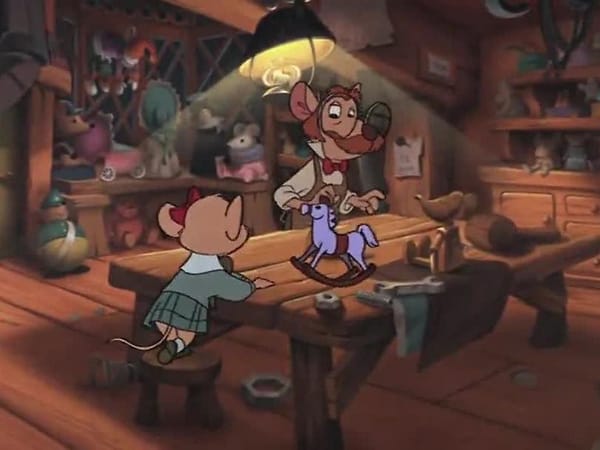I watched Jaws recently, late at night. I was restless and decided that an impulse to watch a movie about terror from the unconscious — right before bed, no less — felt sufficiently out of character to indulge. In doing so, I realized that whether it knows it or not, Jaws is a war movie, and a subliminally effective one.
I scribbled notes as I watched, not with any particular aim, just kind of tracking the flow of symbols, the execution and progression of things, what I loved, what I didn't, trying to break down and simplify the elements in my own way so I could understand how everything worked. I like to do this sort of thing.
The part I was most eager to see has always been my (and possibly everyone's) favorite — Quint's story about the sinking of the USS Indianapolis. This time around, I realized the hidden reason why that scene is so powerful, and so eerie, and why I've always considered it the most thrilling part of the film. It's not just the setting or the superb acting.
Quint's monologue reveals a poetic displacement submerged deeply in the film, and all of a sudden the real horror of Jaws is staring you in the face.
But let's back up a bit.
It's 42 minutes in before we even learn that police chief Brody has a longstanding fear. Up until then, grisly events have been exploding around him, and he's been dealing with his sense of personal responsibility in a culture saturated with greed. He shows fear, but it's nonverbal and reactive.
During the dinner conversation between Brody, Hooper, and Ellen, Brody's central role begins to make more sense. Why this guy? Well, this guy has a powerful, specific, and mostly-hidden fear, which makes him a magnet for exactly the kind of things that are happening around him.
What's he afraid of? His wife says he's afraid of water.
- ELLEN
- Martin hates boats. Martin hates water. Martin... Martin sits in his car when we go on the ferry to the mainland. I guess it's a childhood thing, it's a — there's a clinical name for it isn't there —
"— drowning," says Brody, but that's not the language he and others use to describe the threat of the shark. The shark is "a perfect engine, an eating machine."
This shark, swallow you whole. No shakin'. No tenderizin'. Down you go.
"It's a killer, it's a maneater," Brody tells the mayor. "I'm not going to waste my time arguing with a man who's lining up to be a hot lunch," says Hooper. The shark does not represent evil, cunning, or malice, although eventually there are allusions that there is something distorted and unnatural about its behavior.
The shark is insatiable, mechanized hunger.
During the lead-up to the expedition, we see a swirl of different symbols — bleached-bone jaws, wounded bodies, fins poking above the water, and a single enormous tooth. But when it finally comes into full view, mouth is where the most direct and immediate action happens.

mouth is the simplest visual symbol for this hunger, the primary fear shared by the three men on the boat.
Hungry shark seems to be all this movie is about.
Hungry mouth, don't get eaten, gotta kill the shark before it kills you. It's a proper summer blockbuster, absolutely arresting, with a sense of humor running throughout, and still great fun to watch.
The film's true proportions and its use of the language of war are nowhere to be seen until, way out in deep water, Quint reveals his own deeply hidden fear. Robert Shaw apparently deserves most or all of the credit for rewriting and honing Quint's story about the sinking of the Indianapolis, and I think that Shaw's particular finesse and emotional-creative contributions subtly brought into focus the real fear swimming in the waters of the collective. In 1975, it was very close to the surface. 67 million people went to see this film.

Quint says "bomb" three times. The first two are easy to gloss over because you're mostly thinking about sharks, and sharks are what you get in the four-minute monologue that ensues.
But the spoken words have, in the absence of any supporting visual, gotten you to supply the image of this particular bomb ("the Hiroshima bomb") from the theater of your own mind.
Against this backdrop of even greater loss, Quint describes men being lost in huge numbers, their bodies torn apart, far beyond the reach of the system that got them there.
- QUINT (CONT'D)
- Anyway, we delivered the bomb.
The final repetition of the word carries the payload, and its meaning shimmers in the air. This massive distortion of nature devoured two cities. War is eater of generations; war is hunger.
The new and unexpected symbol ( the atomic bomb ) is introduced in such a manner that it cannot be divided from the emotional potency of the symbol we've been steeped in ( mouth ). They circle one another, close in, and fuse because they share the same intrinsic meaning. The chill you feel is your subconscious recognition of this.
Now the vulnerability and innocence of the beachgoers, every image you've seen of a family in their bathing suits, takes on new and greater meaning.
The generation gap between the men on the boat takes on new significance, too, as well as the fact that Brody doesn't begin to really confront the problem until his son (the next generation) is visibly affected. Addiction is another form of uncontrollable hunger. Anyone who has experienced it can tell you what it's like to look into an open mouth that could very well eat you alive. In such circumstances, it takes a powerful and motivating love to get you out onto the water.
The symbolism of the bomb dives right back to the deep and is easily overlooked, because the film returns to kill that bigass shark, and so the shark again seems to be the primary fear. It's also easy to overlook because there are so many beats that highlight Quint's "compulsion to repeat" — that is, attention-grabbing parallels in the subsequent action that make it seem like this is just one guy encountering his worst nightmare all over again.
The story has to come to a head, and the shark has to die. It dies excitingly and magnificently, but the visual destruction of the animal makes me wince — not only because we now have greater awareness of the interconnectedness of the natural world and the beauty of these fish, but also because "Blow up, you son of a bitch" is not a great long-term strategy for dealing with personal or collective fears, no matter how large they are.

This is the glyph that exists at the nucleus of the movie. I think it's unique to Jaws, and also unique to every viewer who helps create it. Subtly and poetically, underneath the action, mouth-bomb describes an immense hunger that consumes the human body with mechanical efficiency. A perfect engine, an eating machine.



Member discussion